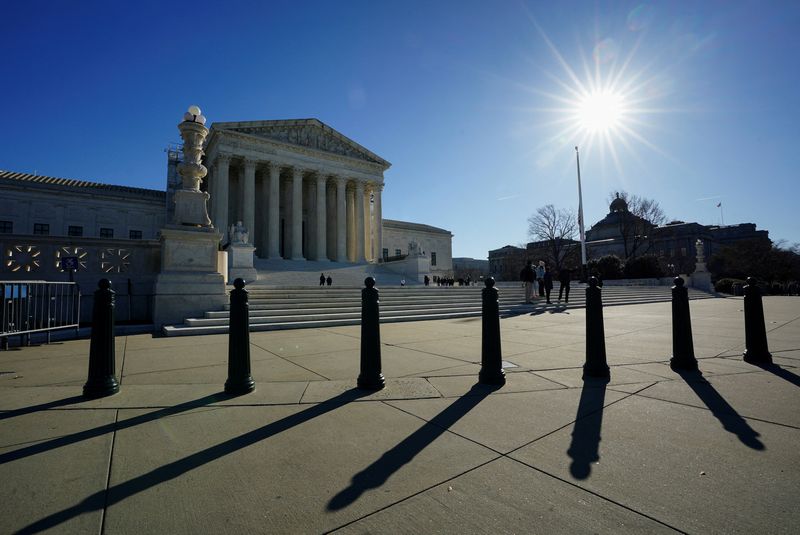By Daniel Wiessner
(Reuters) - An impending U.S. Supreme Court ruling that could curb the regulatory powers of federal agencies may play a critical role in a challenge by Republican-led states to a rule issued by President Joe Biden's administration allowing socially conscious investing by employee retirement plans, according to a new court filing.
The 26 states, led by Utah and Texas, asked a U.S. appeals court late on Thursday to wait to decide whether to block the U.S. Department of Labor rule until the Supreme Court issues its decision on agency powers, expected by the end of June.
The Supreme Court on Wednesday heard arguments in a dispute involving a government-run program to monitor for overfishing of herring off New England's coast. Two fishing companies asked the justices to restrict or overturn the Supreme Court's 1984 legal precedent requiring judges to defer to reasonable federal agency interpretations of U.S. laws deemed to be ambiguous, a doctrine called " Chevron (NYSE:CVX) deference."
Texas-based U.S. District Judge Matthew Kacsmaryk, presiding over the lawsuit challenging the investing rule, said in September that the U.S. law governing retirement plans was unclear on whether such plans could consider environmental, social and corporate governance (ESG) factors in making investment decisions.
The Labor Department's view that plans can weigh those factors as long as they prioritize traditional financial considerations was reasonable, Kacsmaryk said in declining to block the rule pending the outcome of the lawsuit.
The states on Thursday filed a brief with a New Orleans-based 5th U.S. Circuit Court of Appeals seeking to reverse Kacsmaryk's decision. They said Chevron deference does not apply to the case because federal law clearly requires retirement plans to act "solely and exclusively" for the financial benefit of participants.
But if the 5th Circuit finds otherwise, it should wait for the Supreme Court to rule on the fate of Chevron deference before deciding the case, the states said in their filing.
The rule improperly inserts political agendas into investment decisions that affect the retirement savings of hundreds of millions of people, the states said. A subsidiary of Liberty Energy and an oil and gas trade group are also plaintiffs in the case.
Finalized in November 2023, the rule covers plans that collectively invest $12 trillion on behalf of more than 150 million people. It reversed restrictions adopted by Republican former President Donald Trump's administration on considering ESG factors in making investment decisions.
Critics of ESG investing, including many Republicans, have said it advances liberal political and social agendas at the expense of plan participants or shareholders who may suffer financial losses as a result.
The U.S. Department of Justice, which is defending the ESG rule, did not immediately respond to a request for comment.
The brief by the states represents an early illustration of the widespread impact that overruling Chevron deference could have by making it harder for federal agencies to defend their rules in court.
Pushing to eliminate the doctrine is part of a broader effort by conservatives and business-backed groups to curb the powers of what they call the "administrative state" as they seek to weaken the federal agency bureaucracy that interprets laws, crafts rules and implements executive action.
The Supreme Court handed a significant victory to that movement in 2022, ruling that the power to adopt policies involving "major questions" with broad societal impact is reserved for Congress and not federal agencies.
Biden's administration has urged the Supreme Court to preserve Chevron deference, arguing that the doctrine recognizes the need for agencies to "fill in the gaps" when legislation is ambiguous.

The questions posed by the justices during Wednesday's arguments did not reveal a clear majority in favor of overturning Chevron deference. Some of the conservative justices, who have a 6-3 majority on the court, seemed skeptical of the doctrine's continuing force but others signaled hesitation about reversing it.
(This story has been refiled to correct garble in paragraph 1)